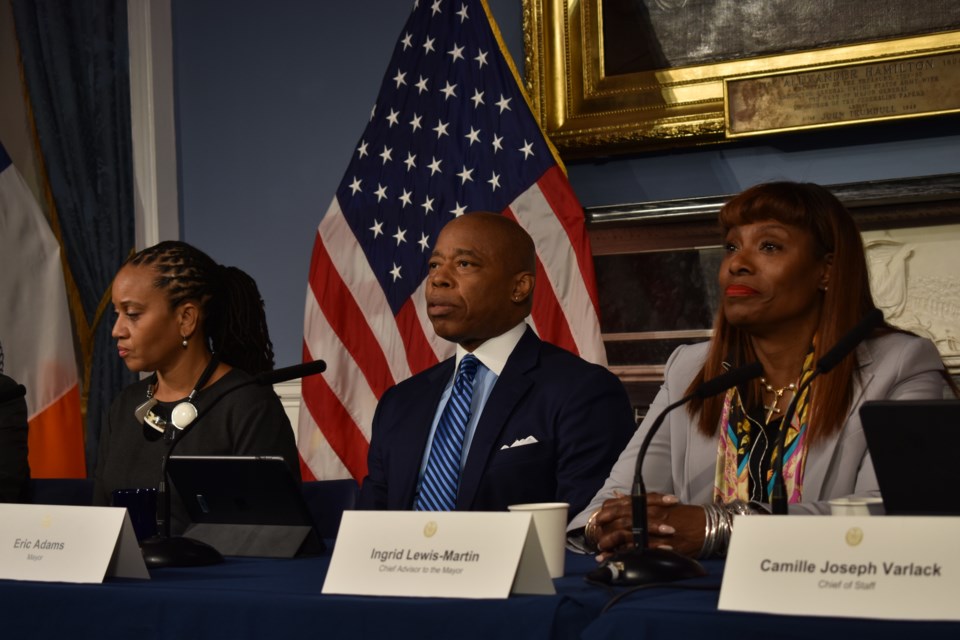The mayor launched citywide operations to shut down unlicensed cannabis shops, and tried to quell fears after a Manhattan woman living in a NYCHA housing complex was hospitalized for arsenic poisoning at his regularly scheduled press conference at City Hall on Tuesday.
Dubbed “Operation Padlock to Protect,” the city adopted an emergency rule that allows officials to inspect businesses selling illegal cannabis products.
Shops selling cannabis with no proper registration, license or permit issued pursuant to the New York State Cannabis Law will be padlocked and fined. Twenty shops were investigated and padlocked after the first day of the illegal cannabis crackdown.
During the press meeting, the mayor conducted a live video conference with New York City Sheriff Anthony Miranda, who was in the middle of a raid on a store selling cannabis products illegally.
“These smoke shops have really become a quality of life issue in our city and every town hall we attend, this issue comes up over and over again,” said Adams. “Our message is clear: We want to close them down, and if you’re out there, we have a lock with your name on it.”
Meanwhile, the mayor and his deputies also addressed inquiries into several NYCHA residents in Manhattan’s Jacob Riis Houses becoming ill with symptoms of arsenic poisoning, one of whom was hospitalized and found to have toxic levels of arsenic in her system in March.
Residents across NYCHA housing complexes have raised concerns about living conditions in their homes for years. An investigation by the Justice Department found that NYCHA lied to government agencies regarding lead paint and other hazards which prompted the appointment of a federal monitor in 2019 to oversee implementation of reforms.
There was a similar arsenic scare in the same housing complex in 2022. A water test that year indicated unsafe levels of arsenic present, which took two weeks for the city to reveal to the residents, but was then negated by a second test one week later, on September 9. Josefa Bonet, 74, a resident in the Riis complex, died on October 1, 2022, with four times the upper limit of normal arsenic levels in her system.
The federal monitor opened an investigation into the 2022 findings, but the results have not been revealed.
“There is no arsenic in the water. There has never been in the city's housing supply,” said Deputy Mayor of Housing, Economic Development and Workforce Maria Torres-Springer. “More than 500 water test samples have been taken from roof tanks to inside apartments to other locations, though that testing has shown conclusively no water quality concerns at Riis Houses.”
"The 2022 example is what happens when you rely on a single test versus multiple tests, and it turned out to be a false positive," said Deputy Mayor for Operations Meera Joshi.
The DEP has done multiple tests in the area, most recently in April 2024, which were all negative, Joshi said.
After the press conference, Adams went to the Riis Houses and drank the tap water in a video posted to X. However, the mayor did not inform the press in advance and it is unclear where exactly the water he drank originated from.
The mayor also addressed the personal data breach that affected more than a million current and former New York City public school students.
No financial data or social security numbers were revealed and the Department of Education is offering two years of free credit and identity monitoring services to any individual affected by the hack, according to Chief of Staff Camille Jospeh Varlack.
“The first thing that former mayor said to me…’Your problem is not so much terrorism but cybersecurity,’” said Adams. ”It’s a global problem and we are being inundated every day by outside influences.”




